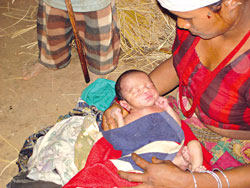|
|
| BORN TO VIOLENCE: Jamu cradles her newborn son, both had a miraculous escape when their house was bombed by an army helicopter in Makwanpur, last week. |
The walls of the wooden house collapse, all six family members run out and jump into trenches dug by the Maoists. Jamu barely has the strength to reach for cover, where she collapses. In the ensuing panic, she forgot her baby inside the burning house. A female Maoist rushes in and rescues the newborn.
RNA soldiers appear from behind the stone walls, bullets are flying everywhere. Pratap is hit in the head.
Mandhoj Baju also runs out of his house as it catches fire, his 32-year-old wife Maili hears him pleading with the soldiers, "We're just villagers, not Maoists." A solider asks him to raise his arms and another one shouts, "Kill that son of a whore." Mandhoj is shot dead. Four-year-old Resam Bahadur Bholan was on the roof while the rest of his family were on the ground floor. He took a direct hit from a bomb dropped from a helicopter.
These stories of desperate Makwanpur villagers caught in a fierce firefight in Lamkana of Phaparbari VDC near Hetauda on 22 January are only just emerging. A Nepali team from the Human Rights Treaty Monitoring Coordination Committee visited the site and issued its report in Kathmandu on Tuesday.
"This is a tragic example of how civilians are paying the price of the conflict," says Krishna Subedi of the seven-member team.
The tragedies that hit the four families of Lamkana are already just statistics that will be added on to the list of 13,000 Nepalis who have lost their lives in the past 10 years.
On Wednesday, King Gyanendra said that except for a few isolated incidents of criminality, the security situation in the country had improved. But after the Maoist ceasefire ran out last month the war has intensified. Neither the Maoists nor state authorities have publicly apologised for the civilians killed in the crossfire in Phaparbari or anywhere else in the past year.
Since 1 February 2005, the country's human rights crisis and its humanitarian consequences have deepened further, especially in rural areas. Insec's newly published 300 Days of Royal Takeover outlines the severe impact on citizens. (See box) Besides the security force and rebels, anti-Maoist vigilante groups backed by the state emerged as a third force. The media was subject to severe restrictions and the government sent soldiers with machine guns to camp in several leading publishing houses. Thousands of journalists were arrested.
"Even the most powerful institution, the judiciary, has lost its independence," says advocate Tikaram Bhattarai. Development activities of both NGOs and the government declined, with the impact felt most in health, education, rural infrastructure and poverty alleviation projects. More families were displaced from their homes, even though they used the ceasefire period to pay brief visits. More children were forced to leave school and migrate to cities both in Nepal and India to work in mostly exploitative jobs.
The economy was hit hard. Tourism reeled, particularly because many western countries issued negative travel advisories. Nearly $ 250 million in development aid was frozen or slashed. And despite the king's assertion in his recap of the past year that foreign relations was 'stable and had clarity' Nepal's isolation has never been deeper. The UN Committee on the Rights of Children in Geneva branded Nepal as a country not fit for children. "It's ironic that international concern for human rights of our own people have been interpreted by this government as foreign interference," says rights activist Gopal Siwakoti. International support has boosted the morale of activists, democrats and journalists to fight back fearlessly for democracy, adds Siwakoti.
As human rights violations mounted in the aftermath of the royal takeover, the UN established an Office of the High Commissioner for Human Rights, which monitors abuses by both the state and the rebels. International pressure hasn't forced the king to roll back on his takeover, but according to Kundan Aryal of Insec it has stopped him from going all the way. Aryal says, "there would have been much more atrocities in the absence of international support."
300 days after February First
. 1,478 Nepalis killed in 65 districts in 2005. The state was responsible for 95
. More than 6,000 political activists and human rights defenders were arrested, many are still in detention
. During the first six months, nearly 1,000 journalists were out of jobs
. Tourism revenue dropped by Rs 1.2 billion.
. Nearly $ 250 million in development aid was suspended



